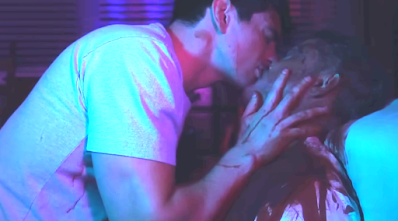his savior
by Douglas
Messerli
Steve Grand
(composer and lyricist), Steve Grand and Arno Diem (directors) Disciple /
2019 [5 minutes) [music video]
It seems like
several of the new breed of gay singers have issues with religion: David
Archuleta and his mother both left the Church of the Latter Day Saints as it
became more and more publicly apparent that Archuleta was gay; in 2022 singer
John Duff faced down the church itself to wonder if Is
It a Sin to love God as a man, hinting at the analogy of
loving another manifestation of God’s love, Duff’s love of other men; and three
years before Duff, Steve Grand went head-on with the manifestation of Jesus in Disciple, turning him
into a kind of “daddy” figure with whom he actually has sex. And that’s to say
nothing about Lil Nas X’s J Christ of 2024, which some have described as the nadir of his remarkable
career to date.
Writing in Pride, Taylor Henderson describes the early and middle parts of the dramatic
musical narrative of Disciple:
“The music
video opens with Grand left beaten and bleeding on the beach. He's found by an
older man who nurses him back to health. ‘Jesus be my daddy,’ Grand croons in
the song's opening line.
‘Mary bows her head, tell it once again / Now
I am just a man, but me and Jesus, we weren’t just friends.’
The two lovers get some heavy make-out
scenes and with the help of his "daddy," Grand battles an ongoing
alcohol addiction. But when he falls off the bandwagon and his inner demons are
set free—quite literally with a Steve Grand doppelganger—things quickly take a
bloody turn.”
And with a little help from alcohol, in
this instance Grand and his doppelganger participate in a kind of threesome
with the Christ figure.
The video lyrics end with a terrifying
story that implicates the singer/disciple himself was partially responsible,
through his behavior, for his daddy Christ’s death, now wanting and even
demanding that he be permitted the full love (and deserved death) he previously
sought in the older man’s arms:
“And now he’s
dead, and now he’s dead, and now
he’s dead
I pushed that
thorny crown a little deeper in his
head
I gripped that
rosary, tied around his lifeless neck
Jesus, my final
savior in the desert
I want to die,
I want to die in your arms tonight
Absolve me from
the consciousness of every man
that I touched
Even the ones
wise enough to scoff my love
Rape me, rape
me, ‘till I’m dead
Rape me, rape
me, until there’s no blood left
Rape me, rape
me, because that’s all you’ll get
I’ll just die
happy to never hear your words again
I’ll die happy
to never hear your words again
I’ll die happy
to never hear your words again”
In the interview with Henderson, Grand
explains his personal connection with the song and its religious symbolism:
"I think
we all know what it’s like to have internal conflict, regardless of the
scale," explained Grand. "Sometimes that conflict can feel so
overwhelming, that it almost feels physical. My partner at the time used to say
that sometimes, in the moments where I was really struggling internally, he
felt like he was witnessing one person split off into two. That has always
stuck with me, so I wanted to give some voice to the way I imagined it was for
him in those difficult moments.
I grew up in a Catholic family that went
to church every Sunday. So all that sort of imagery; all of those stories, have
been embedded within me since before I can remember. So when I’m trying to
convey the idea of a 'savior,' for instance, it’s natural for me to draw on the
stories and the images of Jesus I have seen throughout my life."
Obviously, like Archuleta, Duff, and even
Lil Nas X, Grand has mixed feelings about religion, and particularly in this
case, imagery that so calls up homoerotic scenes, several of which are played
out in the video itself.
Los
Angeles, July 6, 2025
Reprinted from My Queer Cinema blog
(July 2025).






No comments:
Post a Comment